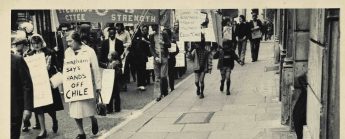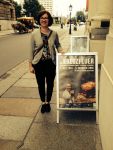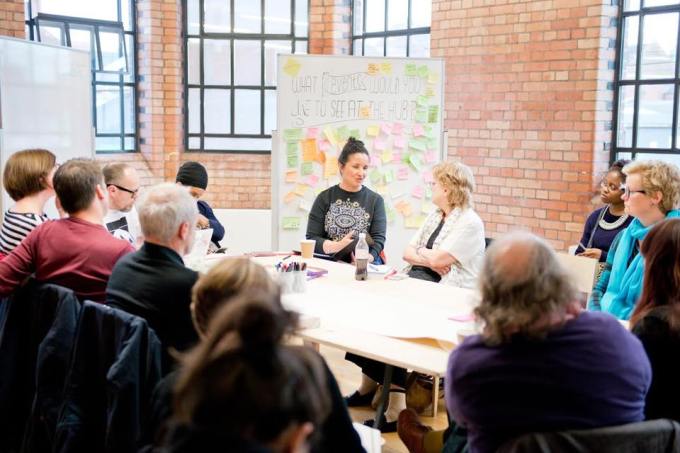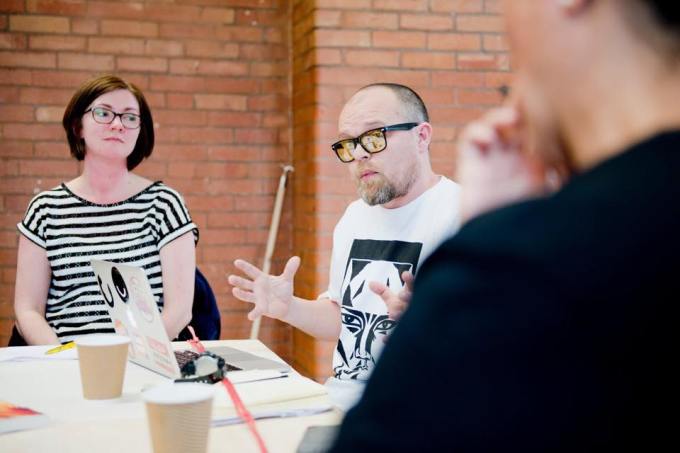Nicola Gauld is the Co-ordinator for Voices of War and Peace: the Great War and its legacy. She is a historian, outreach worker and curator based in Birmingham. You can follow her on Twitter @nicolagauld or on her blog.
In December 2014 Birmingham City Council announced drastic cuts to its budget for 2015 and beyond. The Library of Birmingham, opened in September 2013 at a cost of £189m and the biggest public library in Europe, did not escape and a saving of £1.3m is currently being implemented, resulting in around 100 redundancies to be made in 2015 and a reduction in opening hours from 73 to 40 per week. Further cuts to the service are likely to be made in 2016-2018. The city’s Archives, Heritage & Photography department, housed in the Library, will be dramatically affected. This will inevitably result in reduced access to documents and photographs that are the city’s memory and the loss of skilled and experienced staff will mean that the service can no longer engage with citizens from across Birmingham to tell their stories and include them in the archive for the future.
A recent event at the newly-opened Impact Hub Birmingham, organised by myself, Immy Kaur (Co-founder of the Hub), Fiona Joseph (author) and Jez Collins (BCU/Birmingham Music Archive), discussed how we could deal with this situation. My connection to the archive is closely related to my personal experience of living in Birmingham. After moving here in late 2009 it took many months to feel part of the city, and starting work with the archives in spring 2011 undoubtedly helped me to connect, primarily through the city’s history but also through working with colleagues. For Fiona, who has written extensively about Birmingham’s historical residents, including the Cadbury family, the city’s history and its archive collections are essential for her work and Fiona spoke eloquently about the ‘trail of discovery’ that occurs when you begin to delve into the city’s history. Handling archive material triggers connections to the past, and to restrict access to that material, to letters, photographs, documents, that which connects us as humans, will inevitably have a negative impact. As Fiona remarked, by accepting the loss of the archive we are saying that it’s ok to be divorced from the past. As a ‘citizen archivist’ Jez set up the Birmingham Music Archive, a resource that clearly demonstrates the importance of shared memories and nostalgia, helping people to connect to the past but also to the present and to other people. Jez observed that it was important to reimagine how the service might be delivered – what might be the new ways of working and can that be more diverse and inclusive?
The event attempted to explore the following questions: what will the cuts to the Library and Archives service mean for the city and its residents? What does engagement with the city’s past now look like in this new landscape? How can we, its citizens, help protect and preserve the city’s important historical legacy? And how do we harness our shared knowledge of the past to better inform Birmingham’s future? All who were present at the event understand that the cuts should be resisted and that we should protest vehemently and loudly against them but we also wanted to start thinking about the landscape after those cuts have happened. And they are happening: colleagues and friends are losing their jobs, jobs that they have done for decades, jobs that they love and do out of passion and enthusiasm, jobs they desperately don’t want to leave, but the reality is that Birmingham City Council will not protect them, or attempt to find ways to protect them, and clearly does not value the work that has been done over the years, the active and determined inclusion in the archive of new residents and citizens of Birmingham, the sense of place and identity, belonging even, that has come from the many, many projects the archive has been involved in. Being angry about that, being incredibly sad, demoralised and outraged about the situation will take time to fade but what can we do about it? How can we keep doing the good work, keep reaching out to communities, keep telling those stories that will remain otherwise untold?
We come together and build libraries and archives because the past is bigger than any us. What do we do when the institutions that we build are taken away? Birmingham Archives, Heritage & Photography has recognised that an archive is a collaboration, built together by citizens, demonstrated by the years of valuable outreach work that has been done (for example Connecting Histories, Birmingham Stories). How can we help enable and support that outreach work to continue happening? Sadly the word ‘outreach’ disappeared from the Library of Birmingham’s staffing structure before the new building had even opened but the huge importance of the work that has been done cannot be disregarded (see Jim Ranahan’s recent blog post ‘Real People, Real Archives’ on the 10th anniversary of Connecting Histories). This work is too precious to lose and we must not allow the cuts to prevent this work from continuing to happen in the future. The form in which it happens now needs to be re-thought, re-negotiated and re-navigated.
As Matt Houlbrook remarked during the discussion, we are at risk of writing Birmingham out of UK and world history – is that really what we want?




A tiny bit of evidence from an unlikely source. It goes back to the 1960s and the way Birmingham suffered more than anywhere else the widespread demolition of Victorian city buildings, that relocation, those tower blocks and, in the case of Birmingham, that concrete urban motorway that surrounds the city centre.
During this time the City Engineer was a man called Herbert Manzoni. He was at the heart of what happened to Birmingham’s city centre architecture during the 1950s and 1960s. He had some scary ideas I think. It’s not just that he wasn’t a fan of the existing Victorian architecture, he wasn’t a fan of preserving value, or process, or history. This is what he said; “I have never been very certain as to the value of tangible links with the past. They are often more sentimental than valuable. As for the future generations, I think they will be better occupied in applying their thoughts and energies to forging ahead, rather than looking backward.”
He wasn’t a maverick, this reflected a general view. He was so lauded that when the old Market Hall was knocked down it was replaced by the Manzoni Gardens, named in honour of the City Engineer.
It might be the case that there’s a failure at a civic level in Birmingham, some kind of cultural shame that needs to eradicate the past. Whether I’m right to take Manzoni’s attitude to make a general point, is up to you to decide, but what I would say is that if no value is assigned to the past and links are broken and narratives disrupted then a celebratory mythology is impossible.
Reblogged this on oshriradhekrishnabole.
Reblogged this on Chateaux en Espagne and commented:
#Rally4LoB Protest at Library cuts on 13th June! http://wp.me/P4alwm-9z Birmingham Libraries Campaigns @FoLoB_ @FoBAH_org
Reblogged this on Nicola Gauld.